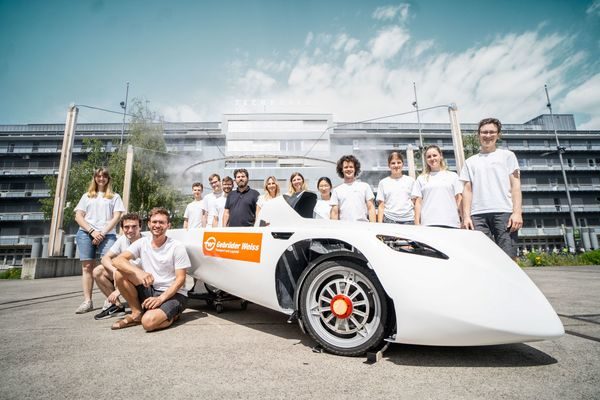Gebrüder Weiss Takes Visionary Solar Car Down Under

Zurich / Lauterach, August 30, 2023. The international logistics company Gebrüder Weiss takes charge of transporting an innovative solar car to Australia for the aCentauri Solar Racing Team of Eidgenössische Technische Hochschule Zurich (ETH). This is where the World Solar Challenge will begin at the end of October 2023. This unique race sees 31 teams cover the vast 3,000 km from Darwin across the Australian outback to Adelaide using solar power alone.
To ensure that the high-tech vehicle can be on its mark on time at the other end of the world, Gebrüder Weiss delivers a customized mix of logistics covering land transport, sea, and air freight.
“Our position as a global logistics company means we are a driver of intelligent transport solutions, actively shaping the mobility of tomorrow,” says Frank Haas, Head of Corporate Brand Strategy & Communications at Gebrüder Weiss. “aCentauri’s solar car is a trendsetter with the potential to revolutionize the transport sector, which is why we are supporting the team on their journey to Australia.”
The students have been working on the development and implementation of this solar car for nearly a year. Designed for durability and maximum energy efficiency, it is emblematic of a future in which the environment takes center stage. “Of course, we would like to win the race. But what is equally important to us is taking an active role in developing efficient, environmentally sound solutions,” explains Alexandr Ebnöther, team manager at aCentauri. “With the support of Gebrüder Weiss, we can demonstrate that solar-powered cars and, by extension, sustainable mobility are possible.”
There is a particular focus at the moment on alternative drives at Gebrüder Weiss. For example, aCentauri’s solar car is covering the first leg of its journey on the logistic company’s zero-emission hydrogen truck.
Gebrüder Weiss regularly reports on the preparations and the progress of the team via a dedicated landing page (http://www.gw-world.com/solarracing) and various social media channels.
About Gebrüder Weiss
Gebrüder Weiss, a global freight forwarder with a core business of overland transport, air, and sea freight and logistics, is the world's oldest transport company with a history that dates back more than 500 years. The family-owned company employs more than 8,400 people worldwide and boasts 180 company-owned locations. The business presence in North America includes headquarters in Chicago and offices in Atlanta, Boston, Dallas, El Paso, Houston, Los Angeles, Miami, New York, San Francisco, Montreal, Toronto, and Vancouver. The company has implemented a wide variety of environmental, economic and social initiatives and is considered a pioneer in sustainable business practices. The company’s emphasis on superior customer service pairs customized solutions with a single point of contact to provide customers with focused, reliable, and economical solutions. www.gw-world.com/us
Contact
Gebrüder Weiss
Karolyn Raphael
Karolyn@wingermarketing.com
312-494-0422 (O)
312-933-5151 (C)
www.gw-world.com/de/news
Related Articles
Copyright ©2024. All Rights ReservedDesign, CMS, Hosting & Web Development :: ePublishing